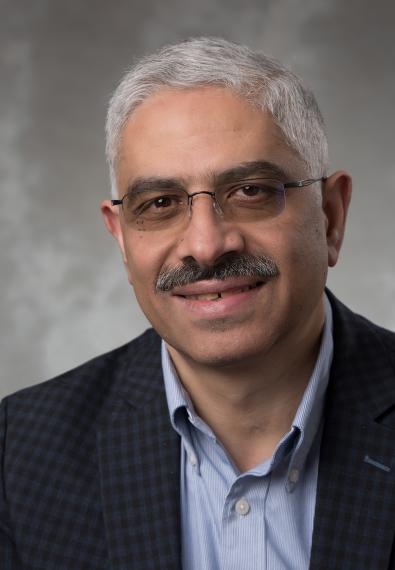Medhat Moussa

Find Related People by Keyword
Instrumentation and Capabilities
Dr. Moussa’s lab develops complete prototypes of robotics systems that may include any of the following components:
- Industrial robot manipulator (e.g. FANUC and Kuka)
- Wide range of sensors and cameras
- Computers and specialized computing hardware like FPGAs
- Software to interface, integrate, and control all equipment.
Education and Employment Background
Prof. Medhat Moussa received his PhD in Systems design Engineering from the University of Waterloo, M.Sc. in from the Université de Moncton, and B.Sc. from American University in Cairo in 1996, 1992, and 1987 respectively. In 2000, he joined the University of Guelph’s School of Engineering, where he is now a full professor.
Research Themes
Moussa’s research is focused on developing robots that sense, learn, and act in non-structured, uncertain, and cluttered environments. We are currently witnessing a revolution in the use and deployment of robotics systems. On top of an increased pace of automation in traditional industries like automotive and electronics manufacturing, robots are now used in a wide range of applications, from health care to agriculture. New records of robot sales have been set every year for the past several years. This revolution is fuelled by incredible advances in several fields like machine learning, machine vision, human-robot interaction, and computing systems and architectures. Moussa maintains strong collaborative relationships with a variety of industry partners, and he is particularly interested in working on real-world problems. Key areas of focus include:
- Robotics grasping and manipulation. Grasping is a hard problem in robotics. Moussa takes a data-driven approach to explore how robots can learn to reach and grasp a wide range of objects in uncluttered and unstructured environments.
- Robot Learning and robot vision. To enable robots to survive in a dynamic environment, it must continuously learn new skills using a wide range of sensors. Moussa explores developing hybrid learning architecture that integrates domain knowledge, past experience and transfer learning to enhance generalization and robustness.
- Applied research projects: Moussa has a significant portfolio of applied research projects that focus on knowledge transfer of research results from the lab to solve real-world problems. The current focus is on two main industrial sectors: automotive and agriculture.
Highlights
- Ontario Ministry of Agriculture, Food and Rural Affairs Ontario Agri-Food Research Initiative grant for "Automated fire blight detection and digitization for apple and tender fruit," 2021
- Ontario Ministry of Agriculture, Food and Rural Affairs Ontario Agri-Food Research Initiative grant for "Improved operational efficiency and enhanced farm management decision making for fruit tree and ornamental nurseries using automaton and precision agriculture tools", 2020
- Agriculture and Agrifood Canada, Ontario Greenhouse Vegetable Growers Association and BC Greenhouse Growers Association Grants for “Reduced production cost and enhanced labour efficiency using the Guelph Intelligent Greenhouse Automation System,” 2018
- Natural Sciences and Engineering Research Council of Canada (NSERC) Discovery Grant for “Multilayered grasp and manipulation system for application in uncertain environments,” 2018
- NSERC Canada-Germany Industry 4.0 Partnering Mission, 2018
- Professional Engineer (Ontario) and AIA Certified Vision Professional -advanced level
Media Coverage
- University of Guelph, CEPS Research Highlight: Modelling Invasive Zebra Mussels
- Greenhouse Canada: Harrow research update: ‘It’s a total team approach’
- Greenhouse Canada: Robotics and automation could address production challenges
- Greenhouse Canada: Robotic Systems Soon in a Greenhouse Near You
- Canadian Horticultural Council: Artificial Intelligence and Scouting
- Financial Post: Canadian food processors beginning to catch on to benefits of automation
- University of Guelph: Robots See Red When Picking Tomatoes